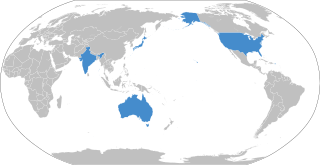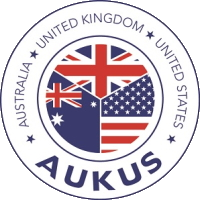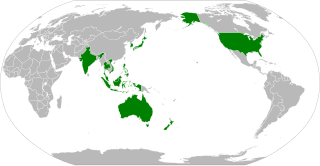
Kiribati, officially the Republic of Kiribati, is an island country in the Micronesia subregion of Oceania in the central Pacific Ocean. Its permanent population is over 119,000 as of the 2020 census, with more than half living on Tarawa atoll. The state comprises 32 atolls and one remote raised coral island, Banaba. Its total land area is 811 km2 (313 sq mi) dispersed over 3,441,810 km2 (1,328,890 sq mi) of ocean.

Palau, officially the Republic of Palau, is an island country in the Micronesia subregion of Oceania in the western Pacific. The republic consists of approximately 340 islands and connects the western chain of the Caroline Islands with parts of the Federated States of Micronesia. It has a total area of 466 square kilometers (180 sq mi), making it one of the smallest countries in the world. The most populous island is Koror, home to the country's most populous city of the same name. The capital Ngerulmud is located on the largest island of Babeldaob, in Melekeok State. Palau shares maritime boundaries with international waters to the north, the Federated States of Micronesia to the east, Indonesia to the south, and the Philippines to the northwest.

Pacific Islanders, Pasifika, Pasefika, Pacificans or rarely Pacificers are the peoples of the Pacific Islands. As an ethnic/racial term, it is used to describe the original peoples—inhabitants and diasporas—of any of the three major subregions of Oceania.

The Indo-Pacific is a vast biogeographic region of Earth.

The Pacific Islands Forum (PIF) is an inter-governmental organization that aims to enhance cooperation between countries and territories of Oceania, including formation of a trade bloc and regional peacekeeping operations. It was founded in 1971 as the South Pacific Forum (SPF), and changed its name in 1999 to "Pacific Islands Forum", so as to be more inclusive of the Forum's Oceania-spanning membership of both north and south Pacific island countries, including Australia. It is a United Nations General Assembly observer.
From 1916 to 1975, Tuvalu was part of the Gilbert and Ellice Islands colony of the United Kingdom. A referendum was held in 1974 to determine whether the Gilbert Islands and Ellice Islands should each have their own administration. As a consequence of the referendum, the separate British colonies of Kiribati and Tuvalu were formed. Tuvalu became fully independent as a sovereign state within the Commonwealth on 1 October 1978. On 5 September 2000, Tuvalu became the 189th member of the United Nations.
The Rim of the Pacific Exercise (RIMPAC) is the world's largest international maritime warfare exercise. RIMPAC is held biennially during June and July of even-numbered years from Honolulu, Hawaii, with the exception of 2020 where it was held in August. It is hosted and administered by the United States Navy's Indo-Pacific Command, headquartered at Pearl Harbor, in conjunction with the Marine Corps, the Coast Guard, and Hawaii National Guard forces under the control of the Governor of Hawaii.

The Allies, formally referred to as the United Nations from 1942, were an international military coalition formed during World War II (1939–1945) to oppose the Axis powers, led by Nazi Germany, the Empire of Japan, and the Kingdom of Italy. Its principal members by the end of 1941 were the "Big Four" - United Kingdom, United States, Soviet Union, and China.

Bilateral relations exist between Australia and Japan.

The Solomon Islands campaign was a major campaign of the Pacific War of World War II. The campaign began with Japanese landings and capture of several areas in the British Solomon Islands and Bougainville, in the Territory of New Guinea, during the first six months of 1942. The Japanese occupied these locations and began the construction of several naval and air bases with the goals of protecting the flank of the Japanese offensive in New Guinea, establishing a security barrier for the major Japanese base at Rabaul on New Britain, and providing bases for interdicting supply lines between the Allied powers of the United States and Australia and New Zealand.

The Australia, New Zealand, United States Security Treaty is a 1951 non-binding collective security agreement initially formed as a trilateral agreement between Australia, New Zealand, and the United States; and from 1986 an agreement between New Zealand and Australia, and separately, Australia and the United States, to co-operate on military matters in the Pacific Ocean region, although today the treaty is taken to relate to conflicts worldwide. It provides that an armed attack on any of the three parties would be dangerous to the others, and that each should act to meet the common threat. It set up a committee of foreign ministers that can meet for consultation.

According to the U.S. State Department, relations between New Zealand and the United States as of August 2011 are "the best they have been in decades." New Zealand is a major non-NATO ally of the United States.
The Tarawa Climate Change Conference (TCCC), was held in the Republic of Kiribati from 9 to 10 November 2010. The purpose of the conference was to support the initiative of the President of Kiribati, Anote Tong, to hold a consultative forum between vulnerable states and their partners with a view of creating an enabling environment for multi-party negotiations under the auspices of the UNFCCC. The conference was the successor event to the Climate Vulnerable Forum held in November 2009 in the Maldives, when eleven climate vulnerable countries signed the Bandos Island declaration pledging to show moral leadership and commence greening their economies by voluntarily committing to achieving carbon neutrality. Based on the lessons learned in the COP process, the TCCC proposed a more inclusive format of consultations, involving key partners among major developed and developing nations.

The Quad, is a diplomatic network between Australia, India, Japan and the United States that is maintained by talks between member countries. The dialogue was initiated in 2007 by Japanese Prime Minister Shinzo Abe, with the support of Australian Prime Minister John Howard, Indian Prime Minister Manmohan Singh and U.S. Vice President Dick Cheney. The dialogue was paralleled by joint military exercises of an unprecedented scale, titled Exercise Malabar. The diplomatic and military arrangement was widely viewed as a response to increased Chinese economic and military power.

The Blue Dot Network (BDN) is a certification framework for quality infrastructure projects. The initiative is a joint project of the governments of Australia, Czech Republic, Japan, Spain, Switzerland, United Kingdom, and the United States that supports investment in high-quality infrastructure projects around the world, especially by the private sector.
Build Back Better World (B3W) is an initiative undertaken by the G7. Launched on June 12, 2021, it would provide an alternative to China's Belt and Road Initiative (BRI) for infrastructure development of low- and middle-income countries.

AUKUS, also styled as Aukus, is a trilateral security partnership for the Indo-Pacific region between Australia, the United Kingdom, and the United States. Announced on 15 September 2021, the partnership involves the US and the UK assisting Australia in acquiring nuclear-powered submarines. The partnership also includes cooperation on advanced cyber mechanisms, artificial intelligence and autonomy, quantum technologies, undersea capabilities, hypersonic and counter-hypersonic, electronic warfare, innovation and information sharing. The partnership will focus on military capability, distinguishing it from the Five Eyes intelligence-sharing alliance that also includes New Zealand and Canada.

The Indo-Pacific Economic Framework for Prosperity (IPEF) is an economic initiative launched by U.S. President Joe Biden on May 23, 2022. The framework launched with fourteen participating founding member nations in the Indo-Pacific region with an open invitation for other countries to join.

The Partnership for Global Infrastructure and Investment (PGII) is a collaborative effort by Group of Seven to fund infrastructure projects in developing nations based on the trust principles of the Blue Dot Network. It is considered to be the bloc's counter to China's Belt and Road Initiative and a key component of the "Biden Doctrine".















